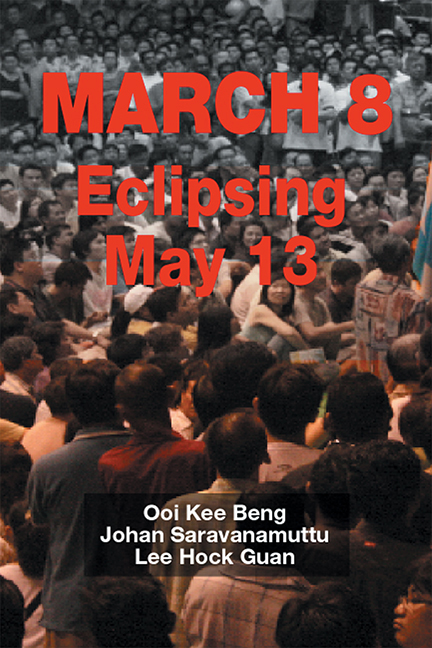Book contents
- Frontmatter
- Contents
- List of Tables and Charts
- Foreword
- Acknowledgements
- About the Authors
- Introduction
- 1 The Opposition's Year of Living Demonstratively
- 2 A Tectonic Shift in Malaysian Politics
- 3 The Ethnic Voting Pattern for Kuala Lumpur and Selangor in 2008
- Postscript: Anwar's Path to Power goes via Permatang Pauh
- Index
- Plate section
2 - A Tectonic Shift in Malaysian Politics
Published online by Cambridge University Press: 21 October 2015
- Frontmatter
- Contents
- List of Tables and Charts
- Foreword
- Acknowledgements
- About the Authors
- Introduction
- 1 The Opposition's Year of Living Demonstratively
- 2 A Tectonic Shift in Malaysian Politics
- 3 The Ethnic Voting Pattern for Kuala Lumpur and Selangor in 2008
- Postscript: Anwar's Path to Power goes via Permatang Pauh
- Index
- Plate section
Summary
Introduction
It was puzzling for many why Malaysian Prime Minister Abdullah Ahmad Badawi, who won by a landslide in 2004, should call a snap general election for March 8, 2008, a whole year ahead of the end of his five-year term. Much of the reasoning revolved around two factors; the economy and Anwar Ibrahim. The economic situation seemed destined to deteriorate, with the American economy likely to go into recession with its knock-on effects on Malaysia. The U.S. is still Malaysia's single largest trading partner with about 19 per cent of overall trade. Even without this happening, petrol, diesel and kerosene prices were due for a hike and the inflation rate had been climbing steadily. Sometime in January, the government resorted to a rationing of cooking oil because of acute shortages. This policy was quickly revoked after a public outcry.
There was of course the Anwar Factor. Anwar Ibrahim, former deputy premier, now de facto leader of the opposition People's Justice Party (PKR) complained perhaps not unjustifiably that the government and the Election Commission had denied him the right to stand by calling for a March election. He would after all have been eligible by mid-April. It is entirely credible that the Abdullah Badawi government agonized over the fear that Anwar as a member of parliament meant trouble. However, the above two factors may not exhaust the plethora of reasons why an early general election really needed to be called. Abdullah himself admitted in a CNN interview that he needed a fresh mandate because of a whole host of new issues, and more time to complete his anti-corruption agenda. However, he surely would have preferred that the outbursts of street protests late 2007 did not occur before his dissolution of Parliament. The Bersih coalition of political parties and NGOs calling for clean elections on November 10 reportedly saw 40,000 people taking to the streets, and the Hindraf rally of some 30,000 Indians came close on the heels, on November 25, 2007. Abdullah took the heavy-handed action of detaining five Hindraf leaders under the draconian Internal Security Act (ISA), which he did not appear to relish.
- Type
- Chapter
- Information
- March 8Eclipsing May 13, pp. 33 - 79Publisher: ISEAS–Yusof Ishak InstitutePrint publication year: 2008

